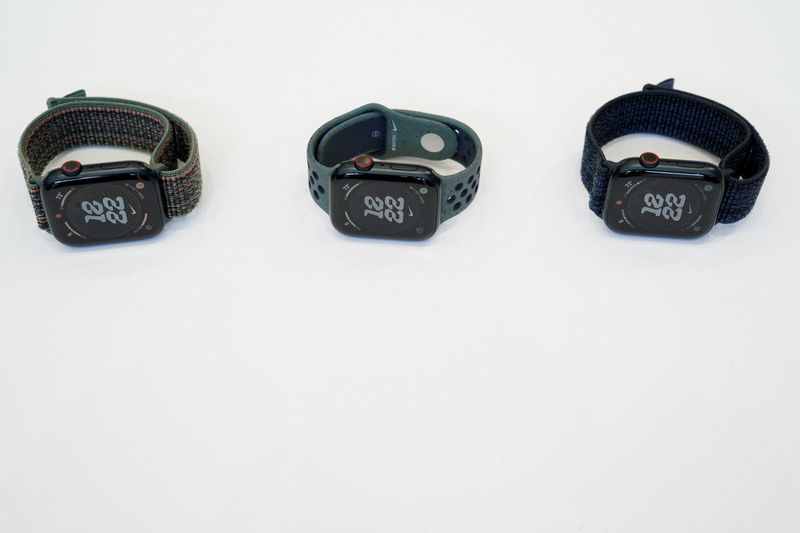By Samrhitha A, Stephen Nellis and Blake Brittain
(Reuters) -Apple said on Monday it would pause sales of its Series 9 and Ultra 2 smartwatches in the United States from this week, as it deals with a patent dispute over the technology that enables the blood oxygen feature on the devices.
The move comes after an order in October from the U.S. International Trade Commission (ITC) that could bar Apple from importing its Apple Watches after finding the devices violate medical technology company Masimo (NASDAQ:MASI)'s patent rights.
The decision is under review by President Joe Biden until Dec. 25, but Apple said it is taking steps to comply should the ruling stand. The Office of the U.S. Trade Representative, the part of the Biden administration handling the case, said that Ambassador Katherine Tai "is carefully considering all factors in this case."
If not vetoed, the ban would go into effect on Dec. 26.
The company said it would pause sales of the watches from its website starting on Dec. 21 and from Apple retail locations after Dec. 24. Other models that do not contain the blood oxygen sensor, like Apple's lower-priced Apple Watch SE model, are unaffected by the dispute.
Ryan Reith, program vice president for research firm IDC's mobile device tracking efforts, said that U.S. holiday sales of Apple Watches will not suffer and that the full impact of the ruling, if it stands, will come in January and February, typically some of Apple's slowest sales months in the U.S.
"Apple has plenty of inventory of Watch 8 and SE so they will have products available during that time," Reith said. "The bigger implication is around whether or not Apple can use the blood oxygen sensor technology that is in question on future devices, or if they'll have to reach a settlement or come up with a new solution."
Masimo CEO Joe Kiani told CNBC in October that he was open to negotiating a deal with Apple. In a statement on Monday, Masimo said the ITC decision "should be respected, protecting intellectual property rights and maintaining public trust in the United States' patent system and encouraging US industry."
Apple has about a quarter of the global smartwatch market, according to Counterpoint Research - a share that tends to rise to more than a third in the fourth quarter during the U.S. and European holiday sales seasons. Both the Series 9 and the Ultra 2 would remain available for purchase outside of the United States, including during the Lunar New Year season in Asia.
Apple said it believes the ITC's finding was erroneous, should be reversed and that it intends to appeal the decision to the Federal Circuit.
Apple shares (NASDAQ:AAPL) closed 0.9% lower on Monday.
Masimo has accused Apple of hiring away its employees, stealing its pulse oximetry technology and incorporating it into the popular Apple Watch.
A jury trial on Masimo's allegations in California federal court ended with a mistrial in May. Apple has separately sued Masimo for patent infringement in a federal court in Delaware and has called Masimo's legal actions a "maneuver to clear a path" for its own competing smartwatch.
The U.S. Patent and Trademark Office rejected Apple's requests to review the validity of the patents at issue in the ITC decision earlier this year.
Engineers at Apple are moving to make changes to algorithms in the smartwatches, adjusting how the technology determines oxygen saturation and presents the data to customers, Bloomberg reported on Monday, citing people familiar with the work.
Apple is working on a range of legal and technical options, if the ban holds. It has begun preparing stores for the change, sending new signs to its retail outlets that promote the Apple Watch without showing photos of the Series 9 and Ultra 2 — two models targeted by the ban, the report added.
An Apple spokeswoman told Bloomberg that the company is working on submitting a workaround to the U.S. customs agency, which is in charge of approving changes to get a product back on the market.
"The patents in question cover hardware. Masimo believes that Apple needs to change the hardware," a Masimo spokesperson told Reuters about the Bloomberg report, while Apple did not respond to a request for comment.
Apple did not comment on Bloomberg's report but earlier on Monday said it was working on "technical options" to ensure Apple Watches are available to customers and that it would "take all measures" to get the devices back to shelves if the ITC order stands.
A presidential administration has not vetoed an ITC ruling since 2013, when President Barack Obama's administration overturned an import ban on Apple's iPhones and iPads from a patent dispute with Samsung (KS:005930).

The Biden administration in February chose not to veto a separate import ban on Apple Watches based on a patent-infringement complaint from medical technology company AliveCor. The ITC has placed the ban on hold for other reasons.
Apple's wearables, home and accessory business, which includes the Apple Watch, AirPods earbuds and other products, brought in $8.28 billion in revenue during the third quarter of 2023, according to a company report.